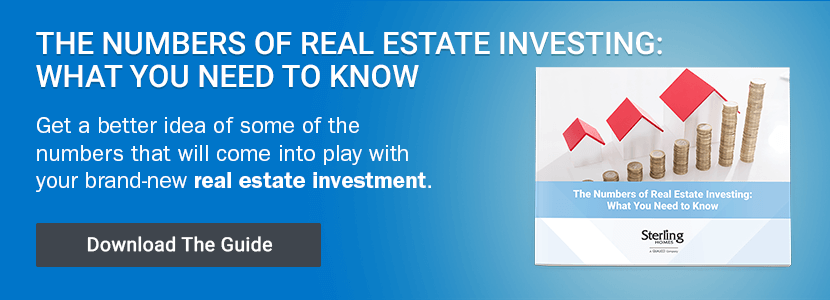5 Must-Have Numbers for Evaluating Real Estate Property

To successfully invest in real estate, you need to pay careful attention to the numbers. Is a particular property affordable? Will you make money or lose money once you’re able to rent it out? Some people overestimate how easy it is to make money through real estate, and you don’t want to get in over your head.
We’ve put together a simple list of the financial details we believe are most important in determining whether or not a property is a good investment. Keep reading to find out what they are, then start crunching some numbers of your own.

Down Payment and Monthly Mortgage Payment
Perhaps the most important numbers you’ll need are the amount of the down payment and monthly mortgage payment. This is largely based on the cost of the home. As an investor rather than a traditional homebuyer, you may be held to higher standards. You will most likely need at least 20 percent of the cost of the home for the down payment if you plan to rent it out. However, if this is your first property, and you’ll be living there and renting out a basement or garage unit, you may only need a 5 percent down payment.
Your lender will be able to tell you what your monthly payment on a particular property will be. Remember that this will include insurance and taxes. These numbers tell you how affordable a property is. If you don’t have enough for the down payment, you won’t be able to buy it. If you can’t charge enough rent to cover the cost of the monthly mortgage payments, it’s probably not the best investment. Explore your options by estimating the costs of different types of properties, then figure out the down payment and monthly payment to see how these choices affect your finances.
Qualifying Income Rates
Proving your income as a real estate investor can be a bit tricky. Obviously, the income that you expect to bring in from your rental units is how you plan to make the mortgage payments, but the banks can be a bit wary of this. What if you can’t rent the units for as much as you think? What if your units sit vacant for several months? Will you still be able to make those payments? Depending on your situation, the bank may want to see that you have experience as a landlord, they may need proof of insurance to cover vacancy, or they may need to see extra cash in the bank to cover any gaps in rental income.

Estimated Rental Rates
Get the advise of a trusted adviser on how much you’ll be able to rent a property for. Look carefully at current rental rates in the area where you’re thinking about buying. For instance, if the average rate for a one-bedroom apartment is $900, you may have a hard time getting $1,500 for your one-bedroom basement suite, even if it has a lot of upgrades. Looking at the current rental market gives you a better idea of what your investment will be worth.
Cash Flow Projections
If you have a good idea of how much money you’ll need to pay each month and how much money you can earn through the rent, you can start to get an idea of the cash flow. Remember that there are going to be expenses beyond the mortgage. For instance, you might need to pay for landscaping or snow removal, and you’ll be responsible for any necessary repairs. Purchasing a brand-new home decreases the risk of large repair expenses, but some things can still crop up. Your total expenses should at least equal the rental income you earn. It’s even better if you can turn a profit.

Gross Rental Yield and/or Capitalization Rate
Another way of looking at how much you can earn from a property is to look at the gross rental yield. This is a number that you get after you divide the total annual rental earnings by the cost of the property, then multiply by 100. The capitalization rate is similar, but it factors in other costs. You calculate it by subtracting your annual expenses from the annual rental income, then dividing that total by the cost of the property, and then multiplying by 100. The higher this number is, the better.
Investing in real estate is a big step, and you should go into it with your eyes fully open. When you take a realistic look at the costs and potential earnings of any property you might purchase, you should be able to get a sense of whether or not it’s a good investment. Don’t hesitate to ask any questions you may have.
About the Author:
At Sterling Homes, our mission is to provide the opportunity for affordable homeownership without compromise. Over the last 70 years, Sterling Edmonton has quickly become one of Edmonton’s most popular builders. We bring more than seven decades worth of exceptional customer service, superior design and unparalleled craftsmanship to the greater Edmonton area. As a member of the Qualico Group, Sterling Homes focuses on greater Edmonton’s finest family communities, while being able to offer some of the region’s most family friendly prices thanks to volume purchasing power for materials, trades and land. This has not only made Sterling one of Edmonton’s bestselling, move-up builders, but also one of the industry’s most respected home providers. It is through our uncompromising commitment to our customers that we proudly deliver the Sterling Advantage – that’s why each and every home we build includes a 10-year home warranty, a completion guarantee and new home warranty excellence rating. Our Advantage is our pledge that, when you build your dream home with Sterling, we will deliver a timely, well-built home you’re sure to enjoy for years to come.
Learn more about:
Sterling Homes - Home Builder in Edmonton
Start The Home Buying Process Now












